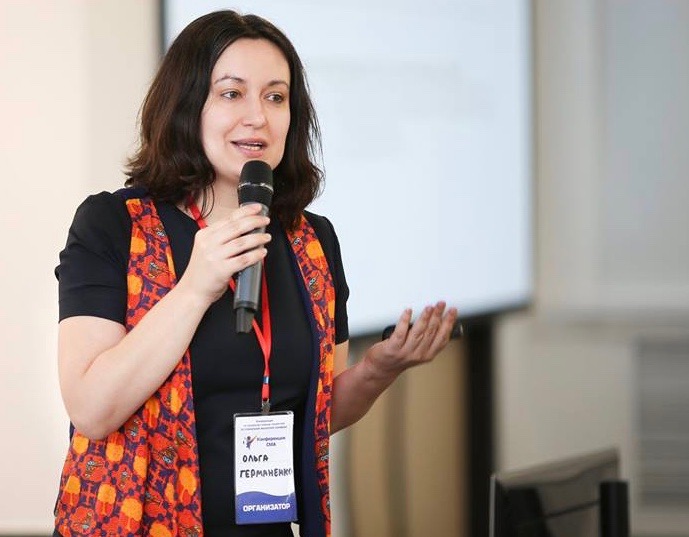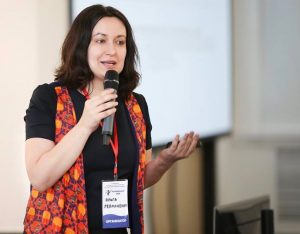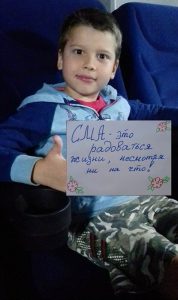40 Russian Children Now on Spinraza, as Moscow-based Advocacy Group Pushes for More Treatment
Written by |

Olga Germanenko, president of SMA Family Foundation Russia, has been a driving force in bring Spinraza to her country. (Photos courtesy of Olga Germamenko)
Doctors have begun administering Biogen’s spinal muscular atrophy (SMA) therapy Spinraza (nusinersen) in Russia for the first time, the head of the country’s SMA patient organization reports.
Forty children with the worst form of the disease — type 1 — began receiving the treatment in July under Biogen’s expanded access program, according to Olga Germanenko, president of the Moscow-based SMA Family Foundation Russia. That followed the January decision by Russia’s Ministry of Health to grant nusinersen orphan drug status, according to information from Biogen.
“I expect the Health Ministry to approve Spinraza before the end of the year,” the first step toward eventual treatment for the 2,000 to 3,000 Russians believed to have SMA, Germanenko said in a phone interview with SMA News Today.
The next step will be far more difficult, she said: persuading the national medical insurance program to cover Spinraza at a time when Russia’s public healthcare system is strapped financially.
The foundation, whose membership has grown from eight families when it started in October 2014 to more than 800 today, has been a driving force behind Russia’s progress in treating SMA. The organization will hold its fifth annual convention Sept. 13-14 in Moscow.
Germanenko said she got a small taste of the benefits of a foundation 10 years ago, after her daughter, Alina, was diagnosed with SMA type 1. She jumped on the Internet to learn more, but the only reference in Russian was a medical encyclopedia entry that described the disease and its symptoms.
About a month after emailing Cure SMA in the U.S., Germanenko received a booklet from the Chicago-based nonprofit containing information about the disease that was unavailable in Russian, along with a Cure SMA refrigerator magnet.
“This was the first support I had received from anyone after my daughter was diagnosed. It was life-changing for me,” she said, adding that “I still have that magnet on my fridge.”
Raising awareness about SMA
Kacper Ruciński, president of SMA Foundation Poland, said Germanenko has been tenacious about helping Russia’s SMA community at a time when the country’s healthcare system has paid scant attention to SMA.
“She’s also very sensitive to what individual SMA families are experiencing,” said Ruciński, who has worked with her at SMA Europe, an umbrella organization representing all SMA federations on the continent. “I can feel her pain in the social media posts she makes about the difficulties that families are dealing with.”
Besides pushing for Russia’s pilot Spinraza program, the SMA Family Foundation helped set up a network of Russian clinical trial facilities, Germanenko said. These have been used by Swiss drugmakers Roche, to test risdiplam, and Novartis, to examine branaplam. It also started a patient registry to seek an accurate count of Russians with SMA. So far, it has 800 names and is growing by about 150 a year, according to Germanenko.
An early foundation accomplishment was offering patients their first comprehensive, easily understandable trove of information online about SMA in Russian. That included information on how it progresses, how neurologists deal with it, and what treatments are available or in the pipeline.
Still another achievement has been raising awareness of the disease among Russian healthcare professionals, top officials, and the general public, Germanenko said. As a result, Anna Kuznetsova — Russia’s presidential commissioner for children’s rights — along with some politicians have urged the government to make Spinraza available to all SMA patients in the country.
Five Russian clinics are administering Spinraza — three in Moscow, one in Yekaterinburg near the Ural Mountains, and one in the Siberian city of Barnaul, Germanenko said. Treatment is limited to type 1 patients under 3 years old who are not on a ventilator, according to Germanenko. That rules out her daughter, Alina, who has type 1, but is 10 and needs breathing equipment.
Germanenko said about 20 Russian families moved to Europe to obtain Spinraza after the European Medicines Agency authorized it in June 2017, six months after U.S. Food and Drug Administration approval.
The Spinraza emigration rate would be higher, except that “obtaining national health insurance coverage in Europe requires permanent residency, which is difficult to get,” she said.
Reimbursement for Spinraza?
All signs point to Russia’s Health Ministry approving Spinraza in the next few months, but — as Germanenko said — “this doesn’t mean reimbursement. That will be another issue entirely.”
Her main concern is that government officials may decide Spinraza’s price outweighs its benefits. Its U.S. retail cost is $750,000 the first year, and $375,000 every year after. In Europe, countries negotiate prices with Biogen individually.
“The problem is that we can’t tell our officials that it will cure our children,” Germanenko said.
However, with a growing body of research showing that Spinraza can stop SMA from progressing, and in many cases improve patients’ quality of life, SMA Family Foundation Russia will press hard for its reimbursement, she said. Complicating her efforts is the fact that Russia has been cutting its healthcare budget in recent years.
“From the time Spinraza was approved at the end of 2016 until now, Russia has lost about 100 SMA patients,” Germanenko said. “How many more will we lose before it’s available here?”
The foundation has worked with healthcare professionals to establish eight SMA clinical trial centers in Russia. The risdiplam trials started in the summer of 2018 and are continuing. The branaplam trials — part of a multi-country testing program — ran from October 2018 until March 2019.
“We would like to get trials of Zolgensma (onasemnogene abeparvovec-xioi),” Novartis’s gene therapy, which the FDA approved on May 24, 2019, Germanenko said. “We have quality clinical centers, excellent medical staff and many patients who are interested in taking part.”
The trials would give Russia experience with a gene therapy, which Germanenko said would be important both to the Health Ministry approving the new treatment and to healthcare providers administering it if Zolgensma wins approval in the country.
Among other long-term goals of the foundation: getting Russia to screen newborns for SMA (something most U.S. states don’t even do yet), ensuring that every region throughout the vast country has SMA specialists and treatment centers, and persuading Russian physicians to start a neuromuscular society.
“Only about 20 to 30 doctors know what to do with SMA, but most are not talking with each other,” Germanenko said, adding that such a society would provide “a network of clinicians learning from each other.”








